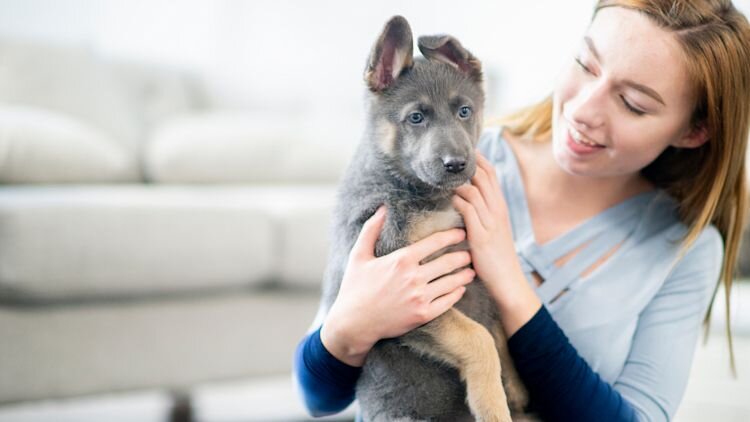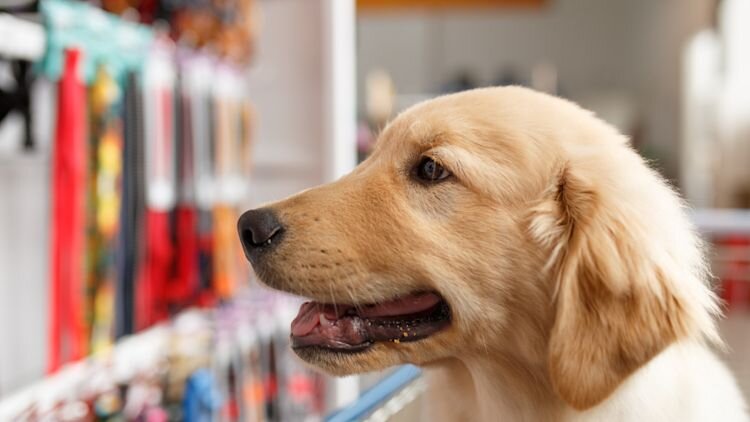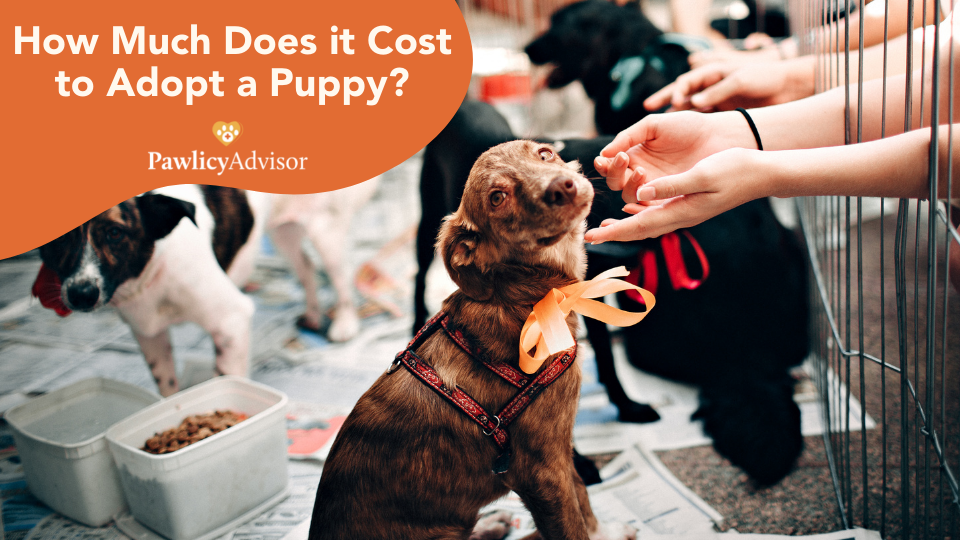How Much Does A Puppy Cost? Here's Everything You Need to Know
Wondering how much a puppy costs? While it may be easy to learn the price of a dog itself, there are a handful of less-than-obvious expenses you should know to fully prepare for pet parenthood.
In this post, we'll cover the ins and outs of puppy costs so you can plan for future responsibilities ahead of time and map out a dog budget with ease.
How Much is a Puppy?
When purchasing a purebred dog, you can expect to pay $500 to $3,000 depending on the type of breed and the location of the breeder.1 For example, the cost of a French Bulldog puppy can be two to three times more expensive than a Beagle puppy. If the breeder operates out of state, you may need to pay for a courier and pet travel insurance to get your new family member to their forever home.
However, if you're considering a companion, know that you can save hundreds or even thousands of dollars by rescuing a puppy from your local shelter or animal welfare organization. The cost of adopting a puppy is typically much less expensive, with adoption fees generally ranging from $50 to $300 — plus the added bonus of saving a dog's life.
What's Included in Dog Adoption Fees?
Most rescue organizations charge dog adoption fees to cover the cost of caring for the animal (i.e., food, supplies). Usually, dog adoption fees include the cost of microchipping, spay or neuter surgery, and vaccinating your puppy. Every organization is different, so be sure to call ahead and ask which expenses you’ll still be responsible for.

Initial Requirements that Increase the Cost of a Puppy
If you buy a puppy from a breeder or adopt one that hasn't had these procedures done before coming home with you, you'll have to pay for them upfront and out-of-pocket. Vets recommend these services for almost all pets.
Vaccination: $80 - $150 for core vaccines
One of the first responsibilities you have as a new pet parent is to find a nearby vet and schedule an appointment. They'll perform a health exam, check for the presence of common congenital conditions in puppies, and recommend a [puppy vaccine schedule] essential to keeping your pet free of communicable diseases.
Generally, puppies require several rounds of a 4-in-1 vaccine shot, a rabies shot, and annual boosters. Outside of the core puppy vaccines , there are a number of additional vaccinations — such as Bordetella and Leptospira — that your vet may recommend where risk is present or businesses may require for boarding or daycare.
You can reduce the overall cost of a puppy by getting these shots from low-cost vaccine clinics, but usually, each vaccine runs about $15 to $20 per shot and up to $30 for rabies . 2 This will be a recurring expense throughout your pet's life, as [dogs need vaccine] boosters to stay immunized on an annual and tri-annual basis (depending on the shot).
Spay or Neuter Surgery: $35 - $500 depending on gender
It's important to spay females and neuter male puppies, otherwise known as "desexing", to prevent pregnancy, reduce the risk of health conditions such as urinary tract infections and prostrate cancer, and decrease the likelihood of behavioral problems.
Most puppies have this surgery between nine months and one year old, but your veterinarian will recommend a safe and appropriate age based on your specific pet's medical history. Depending on where the procedure is performed and if any complications are involved, the cost of spaying or neutering a dog is between $50 and $500 for females and $35 to $350 for males.
Microchip Identification: $25 - $60 per implant
Responsible pet parents microchip their animals so they can be reunited if they ever get lost or separated. Most microchips are approximately the size of a rice grain and contain your embedded contact information that can be scanned if someone were to find your pet and take them to a vet office or animal shelter
To prevent any discomfort, the chip is often implanted while your pet is under anesthesia for their desexing surgery, though sedation is not required. The cost of microchipping a dog ranges between $25 and $60 based on the service location, as private veterinary practices usually charge more than your local Humane Society. You may have the option to pay extra annually for additional pet reunification benefits.
Flea, Tick, and Heartworm Prevention: $50 per month
Once your puppy is old enough, preventative therapies will be essential to ensuring they remain free of common puppy parasites, such as fleas, ticks, and heartworms. Not only can these be detrimental to their health, but in some cases, they can infest your home, affecting your family and anyone else who visits.
There are a variety of options to choose from, including oral and topical therapies, and many offer dual protection. Ask your vet for their best recommendation, but plan on paying an average of $50 for puppy parasite prevention.
PRO TIP: These services all fall under the umbrella of preventive pet care, which you can get reimbursed for through a pet wellness plan. There are many companies who you might already have a policy with that offer discounts for additional plans, such as Lemonade and Nationwide, so check to see if there are savings available to you.
Additional puppy expenses to consider
There's a lot more that goes into taking care of a puppy beyond the price of the dog itself and these one-off expenses. Day-to-day pet care items will account for the bulk of your spending, such as food, supplies, and services. However, veterinary expenses are an important and often overlooked cost of owning a puppy that many people don't consider.
Here's an estimated price list for the things that puppies need, but keep in mind that each expense can vary greatly based on quality, size, location, and more.
Pet Supplies
- Food: Pet food costs will vary depending on your puppy’s size, breed, and food quality. Expect to pay at least $200 a year for quality dog food for smaller dogs and up to $500 a year for large breed puppy food or pets with special dietary needs.4
- Food and water bowls: Your new puppy needs food and water bowls to make mealtimes more manageable and promote hydration throughout the day. These generally cost around $10 to $50.
- Crate/bed: A comfortable dog bed or crate is essential to puppy-proofing your house and is soothing for your new family member. Crates and dog beds can cost between $25 and $250. You might want to start your puppy off with a comfortable blanket instead of a dog bed because many puppies will chew through the cushioning. Waiting until they are past their chewing phase might prevent you from wasting money.
- Potty pads: Puppy potty pads are great for potty training but can quickly add up. A box of 100 puppy potty pads usually costs between $20 and $100, depending on your dog's size. The good news is that if you train your puppy well and they learn quickly, you may only need to buy one or two boxes.
- Poop bags & dispense: Once you get past potty training, you'll trade one expense for another at about $5 to $10 per 100-count of bags. As a responsible pet parent, dog waste removal will always be an ongoing part of your pet care costs. Since you'll need them throughout your pet's life, consider buying in bulk to get a better deal.
- Leash: Leashes and collars may be provided when you adopt a puppy. However, you should purchase one immediately to safely take your pet on walks. Leashes generally cost between $10 and $50, with many different styles to choose from that offer more or less bells and whistles
- Collar: Collars are necessary for leashing your puppy and keeping important information, like your dog’s tag and identification. Expect to pay anywhere between $6 and $50 for your puppy’s collar.
- Toys: Every puppy needs a couple of toys to keep their minds and body stimulated and active! Make sure that you budget at least $10 or upwards of $200 for toys in your puppy’s first year.
- Treats: Treats are wonderful for obedience training and are fun to give your puppy. Budget anywhere from $50 to $300 for treats yearly.
It's wise to keep tabs on any other puppy accessories you pick up — like an engraved name tag, car safety restraint, portable pet carrier, even a life jacket or hiking booties — to ensure you still have enough to cover their necessary services and essential health care at the vet.

Pet Care Services
Getting a puppy costs a lot of money, but it also costs a lot of time. If you're not prepared to exercise them daily, invest in their training, groom them on a monthly basis, or leave them alone for no more than six-hour intervals, you'll need to hire professionals for help.
- Dog walker: Hiring a dog walker can run $15 to $40 per 30-minute walk. Some dog breeds have higher exercise requirements, so expect to pay double that price for hour-long walks.
- Obedience training: Inconsistency is one of the biggest mistakes people make when training a dog, so you'll want to attend several puppy classes for the best results. The average six-week group class costs $250.3
- Dog groomer: A basic bath and blow dry for your puppy at the groomer's might only cost $20 to $30, but dogs will also need their nails trimmed, teeth brushed, ears cleaned, and anal glands expressed. The full suite of services runs about $50 to $75 for small- to mid-sized breeds and twice as much for large breed dogs as well as those with behavioral issues.
- Doggy daycare and boarding: How much a puppy costs to supervise depends on whether you place them with a person or a facility. Generally speaking, doggy daycare is roughly $40 per eight-hour visit, whereas overnight stays can cost upward of $75 or more.
Health Care Costs
The cost of vet visits is steadily increasing with the advancement of technology, shortage of providers, and economic inflation.
- Basic vet care: All [pets need annual wellness exams] for a routine checkup, which typically cost about $150. Remember that in your puppy's first year, you will also need to budget for roughly four vet visits than can amount to approximately $600.4 In the event your pet catches a common illness in puppies and requires a sick visit, it might cost another $75 to $200 for labratory tests, diagnosis, and treatment.
- Emergency vet care: While your puppy's occasional vet appointments may be easy enough to manage, it's the cost of unexpected veterinary care that significantly adds up. The average emergency vet visit costs around $1,000, but often amounts to $5,000 or more for surgery and hospitalization.4. Unfortunately, these emergencies are more common than you may think — estimated to occur every six seconds in the United States — as there's a long list of household hazards for dogs and accidental injuries in puppies.
- Pet insurance premium: Many pet owners use pet insurance to proactively plan ahead for their puppy's health expenses. Depending on your plan, you can get reimbursed between 60% to 100% of covered veterinary costs, substantially reducing the cost of puppy care. The average cost of pet insurance for a dog is less than $50 per month, but it is usually much cheaper for puppies.
You can't predict when you'll need it, but it’s good to put in place while your puppy is still young and healthy, because any health issue that arises prior to enrollment will be considered a pre-existing condition and excluded from your policy coverage.
How Much a Puppy ACTUALLY Costs
So, in light of all these additional expenses, how much does a puppy actually? In just the first year of dog ownership, pet parents pay between $1,500 and $2,000 to cover all their puppy's initial costs, according to a 2021 news report.5
Note that this figure is an estimate of how much a puppy costs after adoption or breeder fees are paid. The price of a purebred puppy can easily double or even triple that amount depending on the breed you choose. Breed also can play a big role in how often you visit the vet due to hereditary conditions, as there are some [dogs with more prevalent health issues than others.
Budgeting Tips For a New Puppy
If you want to adopt or buy a puppy, making a budget is crucial. Budgeting helps you avoid spending too much and saving too little. Anywhere you can stretch your dollars farther will give your puppy's budget a little breathing room.
Here are a few suggestions on how you can save money on puppy care:
- Wait to buy a dog bed. Many puppies will chew through or ruin a new dog bed by having an accident on it. If you hold off on this puppy purchase until your pet is past their chewing stage and potty trained, you could spare yourself from potentially wasting $50 or so on a bed by that's stained or torn apart. Instead, place some gently used blankets in their crate or playpen that they can curl up in.
- Resist unnecessary purchases. While it may be tempting to buy every adorable puppy toy, your puppy will be satisfied with just a few in rotation — after all, it's your attention and love they want most! When you do buy toys for your puppy, prioritize durable, enriching, and safe ones over those that won't last a week.
- Ask for hand-me-downs. Your friends and family might have small water bowls, collars, harnesses, training leashes, chew toys, and more lying around that their dog has long outgrown. They'd likely be happy to see those puppy supplies get a second life in a new home. You can also find many of these items at discount stores and thrift shops.
- Rethink treats. Treats can be especially helpful when training food-motivated puppies, and they help strengthen the bond between you and your four-legged companion, but you don't need to buy the fanciest bag in the store. Opt for calorie-conscious, affordable treats, or try making them at home! There are many fruits and vegetables dogs can eat that are healthy, tasty, and cheaper alternatives.
- Invest in pet insurance. Pet insurance is worth the price you pay upfront because it can save you hundreds, if not thousands, of dollars down the road. Beyond that, it provides priceless peace of mind during situations that are often filled with stress by ensuring you never need to worry about the cost of caring for your sick or injured puppy.
Key Takeaways
- Adopting a puppy is usually significantly cheaper than buying a puppy through a breeder or pet store. In comparison, the cost to adopt a puppy is usually around $150, while the cost to buy a puppy is $1,000 or more.
- An animal shelter may cover certain costs for puppies included within their dog adoption fees, such as vaccinations, spay/neuter surgery, and microchipping.
- There are many one-time and ongoing puppy expenses you'll need to pay for within the first year of pet parenthood, so budget appropriately to set yourself up for financial success.
References
- One Green Planet, “The Cost Difference Between a Rescue Dog and Puppy Mill Dog” Accessed March 30, 2022.
- American Kennel Club, “Your Complete Guide to First-Year Puppy Vaccinations” Accessed March 30, 2022.
- Money U.S. News, “Costs to Consider When Adopting a Pet” Accessed March 30, 2022.
- Pact for Animals, “How Much Cheaper Is Adopting a Dog vs Buying One?” Accessed March 30, 2022.
- CNET, “Here’s how much it costs to own a dog or cat in 2021” Accessed March 30, 2022.
Do you want to find the best pet insurance?
Let's analyze your pet's breed, age, and location to find the right coverage and the best savings. Ready?
Analyze My PetAbout Pawlicy Advisor
The pet insurance marketplace endorsed by veterinarians, at Pawlicy Advisor we make buying the best pet insurance easier. By comparing personalized coverage and pricing differences we can save you a ton of money, up to 83% in some instances!
Instantly Compare Pet Insurance Plans
Guides
Determine If Pet Insurance Is Worth It
Comparison Charts
Find Your State
Dog Insurance
Senior Content Manager
Kaelee Nelson is a die-hard dog mom, part-time dog trainer, and ultimate pet enthusiast. She recently rescued a puppy named Zoey who went from the streets of Mexico to the big lights in L.A. after Kaelee helped her become officially studio-trained for production work, with the goal of strengthen her dog's confidence as well as the bond they share. Kaelee remains passionate about pets in her role as Content Manager by helping owners prepare for the financial burden that often comes with giving our furry BFFs the best care possible. Enrolling Zoey in a pet insurance policy was a no-brainer for Kaelee, as it enabled her to get reimbursed for vet costs like spaying, vaccinations, routine care, and more.
